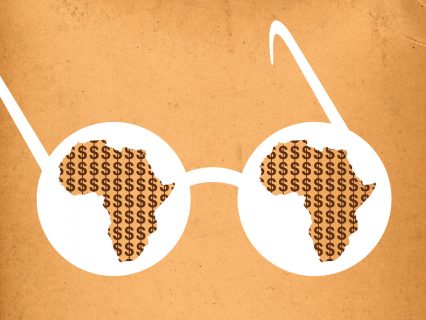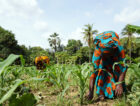Securing finance to support African exports and imports can be a gamble, subject to the whims of global markets and the changing risk appetite among international banks. Rebecca Spong reports.
After suffering from a collapse in commodity prices, depreciating currencies and falls in foreign direct investment; problems caused by a financial crisis outside of the continent’s borders, African borrowers might think they are due for a run of luck.
And indeed some are. There have been a number of high-profile deals supporting African exports to date this year. The annual pre-export facility (PXF) for the Ghana Cocoa Board (Cocobod) deal closed in August with a record level of commitments and an oversubscription reaching US$1.8bn, although ultimately the deal was scaled back to US$1.5bn.
Speaking to GTR, Anne-Marie Woolley, director, head of structured trade & commodity finance, Africa, at Standard Bank, remarks: “Although at the beginning there were concerns over widening liquidity premiums, ultimately this is a well-priced transaction with a good track record.”
The deal demonstrated that appetite for African risk is creeping back. Last year, there were worries that Cocobod’s annual facility would fail to raise adequate financing. The pricing had to be increased to 250 basis points (bp) to attract lenders, whereas this year’s deal was priced at 90bp.
Other successful borrowers include Faso Coton in Burkina Faso, securing a US$11mn pre-export facility at the beginning of this year, and a number of telecoms firms including Zain Communications Ghana and Zain Sudan all successfully raising trade financing (see table 1).
Inevitably oil economies are always on the radar of international trade banks, especially now that prices are stabilising and new oil producing nations are appearing. Ghana is now producing oil, and Deutsche Bank is in the process of arranging a pre-export finance facility for GNPC (Ghana National Petroleum Company).
In Nigeria, the political system has stabilised with a permanent new president and a reformed banking system in place. Against this backdrop, the national oil company NNPC is said to be approaching international markets for debt financing.
But it’s not just oil that is catching the eye of the international financial markets, prices for many commodities are now looking more attractive.
Commodity rush
In July, the London hedge fund Armajaro made a headline-grabbing move, buying up 240,100 tonnes of cocoa, approximately 7% of the world’s annual cocoa production.
Co-founder of Armajaro, Antony Ward’s purchase pushed cocoa prices to an all-time high, but the success of his gamble rests on cocoa prices continuing to climb upward.
But whether such speculative activity benefits African producers and economies is debatable.
With West Africa accounting for a third of the world’s cocoa production, it should follow that rising cocoa prices benefit the producers as long as the money gained through sales is invested in the farms; in efforts to plant new trees, buy better insecticides and use higher quality seeds.
However, bank speculation on commodity prices has been criticised for fuelling price volatility and damaging developing countries.
A report from a campaigning organisation World Development Movement (WDM) released in July commented: “Volatile prices also make it more difficult for farmers to plan and invest. At a country level, wild swings in commodity prices can destabilise the economies of commodity exporters and importers.”
While African exporters might get attractive prices for their commodity exports in the short term, importers are forced to pay more for essential foodstuffs, and consumers face higher prices.
Furthermore, there are suggestions that the influence commodity price trends wield over actual economic growth in Sub-Saharan Africa have been over-exaggerated.
“Commodity price trends will remain an important determinant of the availability of private external financing for Africa, although the importance of resources in driving actual economic growth in Sub-Saharan Africa has traditionally been overplayed,” stated a report by Standard Chartered released in July.
While large African exporters are securing well-priced pre-export deals, such research suggests that this is not translating into economic growth throughout the African continent.
There are now growing demands for international banks to pay attention to the long-term growth of Sub-Saharan Africa, supporting importers, and not just dipping into the market for good returns on well-known export deals.
Such calls are even coming from the World Trade Organisation (WTO).
Pascal Lamy, head of the WTO, has spoken about the need to increase financing capacity in Sub-Saharan Africa for all types of deals, particularly import transactions. If financing fails to be delivered, he worries that world trade volumes will slow again.
Commenting at a conference in June, he urged banks to fund African imports: “Given the commodity dependence of these countries, this [lack of finance] remains a serious matter for concern: financing commodity exports and not imports would be a short-sighted strategy.
“Import financing is also allowing for essential inputs to make future exports, be it commodity-based, competitive.”
He urged banks to be long-term partners aiding African development. “And keep your lines of credit open. Not just for the most profitable commodity deals.”
International bank activity
Inevitably during the course of 2008-09, banks saw a decline in their African business, and are only slowly re-building their capacity.
“As you know, and contrary to common belief at the beginning of the crisis, no country was fully spared from the impact of the global economic slowdown. This was also true for Africa,” comments Vinit Chandra, CEO, Barclays Africa.
“Prices of commodities went down as a result of subdued global demand; FDIs [foreign direct investment] dwindled, trade flows receded and as a result of all these factors local currencies weakened. Some of our large corporate customers, especially those in the commodities exportation sector, had to reduce their workforces.”
Yet, despite this backdrop, Chandra asserts that Barclays Africa business remained profitable throughout the crisis, with growth in both income and profit figures.
“We managed to do that by refocusing our efforts on profitable segments of the market, and on countries that were less impacted by the crisis.“
And for many international banks, Africa is now deemed as a growth market. “We see a land of opportunity and growing ease of doing business, rather than increasing barriers to doing business in the region,” Chandra adds.
“There certainly is increased demand,” remarks Anne-Marie Woolley at Standard Bank, reflecting over the past eight months.
“You see many borrowers, from multinational groups looking to raise finance at subsidiary level rather than treasury level, so there are more transactions in the market than you’d previously be looking at.
“There really is the whole dynamic – local importers of fertiliser looking to raise finance offshore, African banks looking to raise money to finance trade finance books, as well as your usual commodity-backed stuff.”
Standard Bank has also fully utilised its US$400mn line of credit from the IFC, granted by the IFC in 2009 to support trade in Sub-Saharan Africa. The credit line is part of the IFC’s US$5bn global trade liquidity programme (GTLP) launched last year to improve trade finance markets. The bank will be looking to work with the IFC on similar programmes involving guarantee schemes, rather than liquidity provision in the near future.
HSBC is another bank to strengthen its African presence, eyeing up a majority stake in the South African bank Nedbank, and no doubt eager to capitalise on the growing Africa-Asia trade flows.
Problems ahead
Yet, there are still persistent grievances with Africa about the lack of access to trade finance.
The Bankers’ Association for Finance and Trade (Baft-IFSA) held their third Africa bank-to-bank forum in Accra, Ghana at the end of July.
During the event, discussions revolved around how to increase investment and liquidity in the African markets. “It was very positive to see African banks galvanise around major issues – and one is trade finance and how to get more trade finance flowing in the region, Donna Alexander, chief executive officer of BAFT-IFSA, tells GTR.
Jean-Francois Lambert, global head of structured commodity finance at HSBC repeats concerns that it is the lack of import finance rather than export finance that is the problem, with regulatory issues being one of the reasons international banks may be reluctant to take on African risk.
“Banks are keen to focus on commodity export finance deals which are regularly oversubscribed even at the worst of the crisis. The issue lies with the ability of local Sub-Saharan African banks to get access to hard currency to support their customers’ import requirements.
“In a Basel II environment, banks providing this funding are facing a sharp increase in capital cost.”
Lambert adds that increasingly robust and strict Know Your Customer (KYC) protocol is also having a negative effect on the availability of credit to emerging market economies.
Under current Basel II regulations, the problem lies with the assessment of counterparty risk. If an international bank wants to complete a trade finance transaction to a bank in the Democratic Republic of Congo or Sierra Leone for example, they have to allocate capital in relation to the counterparty risk.
Credit committees are often reluctant to agree to relatively small trade finance deals that eat up huge amounts of capital, when the funds could be diverted into “safer” financing vehicles.
As Standard Bank’s Woolley notes: “Country ratings and the potential consequences of Basel II, and possibly Basel III, will inhibit banks. Not many of these countries have an international rating, so all of our capital appetite is linked to having to grade particular clients.
“Inevitably if you go through that you have to decide whether to use an external rating agency to judge risk and capital consumption or to spend the time, money and effort to do your own analysis for just one transaction. So that can be a hindrance.”
Donna Alexander also noted that problems surrounding sovereign and political risk were high on the agenda of the African banks themselves at the Accra forum: “What you see happening now is, because of the global crisis, you might have a African bank that is very well capitalised, but they are in a country with high sovereign or political risk – or next to a country with serious sovereign risk caused by political upheaval. So these banks can be at a disadvantage due to the region where they sit. But they are very viable, very well capitalised, well-run banks,” she explains.
“The voice of frustration at the forum was palpable,” she adds.
The solution perhaps lies in changing the way ratings agencies rate such banks, and criticism of methods employed by ratings agencies is not something solely applicable to Africa. There is a global movement to find an alternative to current risk assessment models provided by the top three credit rating agencies.
African financial infrastructure
Payments infrastructure development was another key theme at the Baft-IFSA Africa forum, as it is seen as a means of ensuring quicker, smoother intra-African payments.
“There may be as many as 13 different regions that rely on different payment structures. For example, Francophone regions, Southern Africa and other regions are working on their own regional infrastructure. It would be much more efficient and cost-effective in the long run if the various regions enjoyed much higher interoperability across the continent – otherwise it can inhibit trade flows,” comments Alexander.
“A fair question asked at the conference was why, when doing payments between Ghana and Rwanda, do the payments have to go via London? Sometimes it’s quicker to walk the cheque across the border,” she notes.
Baft-IFSA is hoping to support conversations between different regions on guiding principles which will ultimately result in the establishment of an integrated infrastructure.
Furthermore, Baft-IFSA is keen to support African banks’ implementation of best practices to improve the risk profile of such institutions.
Ensuring widespread use of the Baft-IFSA master participation agreement (MPAs) for secondary market trade risk is another initiative Alexander is keen to develop.
“We are very interested in making sure the Baft-IFSA MPA is used by banks in African countries and accepted by regulators as a useful tool for the banks. Previously, some regulators who were not familiar with MPAs, thought it was for the purpose of derivatives trading – which it is not.”
Intra-African trade
Fundamentally a bank outside of Africa won’t take on an African deal if they think there’s a high chance they’ll end up losing their money. To change this, African governments and regulators need to implement changes to improve their country’s risk profile.
Vice-president of Afreximbank, Okey Oramah, comments: “Countries need to continue implementing appropriate macroeconomic policies.
“Momentum should also be maintained on the political front through early resolution of remaining conflicts that give Africa a bad image internationally.
He adds: “A strong domestic banking sector facilitates access to international trade finance and African countries must strengthen theirs through proper supervision and ensuring that the banks are better capitalised.
He argues that it is perhaps better to have just five well-capitalised and managed banks than to have 20 small poorly managed banks. “Trade is a volume business and it is only well-capitalised banks that can finance this activity efficiently,” he remarks.
Furthermore, asides from in North Africa and South Africa, most other African nations do not have institutions offering factoring services or credit insurance.
“There is much to be done by everybody and we in Afreximbank are doing our best to encourage the development of enabling institutions, building trade finance capabilities, and talking on deals in difficult markets,” he adds.
The bank has partnered with Zimbabwe to launch an economic and trade revival facility of up to US$70mn. The government of Zimbabwe is contributing to this facility.
The Africa Finance Corporation (AFC) is another institution helping to support greater intra-Africa flows of trade finance. In July it signed a master risk participation agreement for trade transactions with Nigeria’s Access Bank.
Each institution can now provide risk cover, with or without funding, for trade transactions originated by the other. The agreement is aimed at boosting intra-African trade, including oil imports and exports, and it is expected that trade transactions in excess of US$100mn will be supported by the scheme.
Taiwo Adeniji, director, financial institutions and advisory services, tells GTR that AFC hopes to expand this risk participation scheme to other African banks soon.
“The international banks have started coming back to Africa – but they still haven’t achieved the levels we saw in 2007,” he notes.
“There is a lot of justification for African institutions to pool their resources and leverage their respective strengths, and to increase trade capacity for their exporters and importers,” he adds.
Stewart Kinloch at the African Trade Insurance Agency (ATI) believes that the availability of finance for African exporters should be more accessible, and believes some banks (African and non-African) are being overly conservative about certain risks.
“A lot of people blame the lack of access to finance on the financial crisis – but that mainly affected the high-end exporters here in Africa. I think bankers have taken advantage of this, using it as a grand old excuse for not taking risks.”
In contrast, ATI is making the most of this heightened risk aversion, seeing growing demand for its insurance products covering trade deals for African companies.
In 2008 it issued or renewed 33 policies, and in 2009 it managed 61 policies. Now in 2010, ATI completed 28 policies in the first quarter and 12 in Q2, so is on target to exceed 2009’s business volumes.
ATI works by creating collateral for banks where it doesn’t exist.
“We are taking what is a worthless piece of paper – the receipt for the goods – and turning that into something that the bank can lend against. It allows people to monetise their sales so they can perhaps access finance where they couldn’t get it before, or access finance at a cheaper rate than otherwise would be the case.”
S&P rating agency has granted ATI a single A rating, meaning it is more highly rated than the countries it is operating in.
Furthermore, the threat of government intervention or political action or inaction has been mitigated by the structure of ATI. To do business in a certain country, ATI requires that the country becomes a member of the ATI group through the government taking shares in the company. If ATI has to pay out claims due to political intervention on a deal, then the insurer will ultimately be using money from the African state in question.
“It’s a nice position to be in,” comments Kinloch. “From a bank’s point of view, they love to get their hands on our paper – it enhances their probability of default from an amount that is unknown to a much reduced default probability that comes with our single A status.”
ATI is mainly active in East Africa, but is looking to move into the west, and has concluded membership negotiations with Ghana and a number of other countries, and is pending a review by the World Bank.
Brazilian influence
As well as risk appetite being generated within Africa, interest in supporting African businesses is also coming in from beyond the traditional western markets.
The growth of Africa’s export business is increasingly reliant on demand from other emerging markets (See chart 2). South-south trade flows – either between Africa and Latin America, or Africa and Asia – are well on the way to usurping the importance of developed-developing market flows.
“It is very clear that the south-south trade routes are where things are happening post-crisis; Europe is dealing with its own problems, US is only slowly coming back,” comments Donna Alexander, adding that Baft-IFSA is setting up new bilateral meetings between Africa and Asia to facilitate improved business and trade connections.
This year’s Ghana’s Cocobod deal illustrates such trends, with a Chinese bank, ICBC, acting as an MLA. The arrangers held an Asian roadshow in Beijing for the first time ever, as well as holding their usual London show.
The Brazilians are also looking to move into the African market. In early August, Brazil’s Banco do Brasil and Banco Bradesco signed an agreement with the Portuguese Banco Espirito Santo (BES) to create a new company to operate in Africa.
Unlike banks in the developed markets, Brazilian banks are in expansion-mode, being well-capitalised and ready to lend. Both Banco do Brasil and Banco Bradesco have been raising capital in the international markets, and are likely to return soon.
Banco Bradesco offered US$1bn in dollar-denominated bonds on the international markets in early August, and Banco do Brasil raised R9.76bn (US$5.54bn).
The Brazilian banks might lack the knowledge or experience of the African market, but they will leverage on BES’s legacy in the continent. Their move into Africa also has the full backing of the Brazilian government, with Brazil’s finance minister Guido Mantega announcing the MoU in August. He made it clear the government is supporting the expansion of Brazilian banks, irrespective of whether they are public or private institutions.
Carlos Suarez, banking analyst at IHS Global Insight, sees Brazilian banks as having the competitive edge over the western European or North American banks in Africa.
“West European banks are under pressure from the stress tests they are running, whereas the Brazilian banks are expanding, are very well capitalised and haven’t suffered from significant deterioration of their asset quality.”
“There will be extraordinary support from the government if anything negative happened. If they need more capital I am sure the government will provide it.”
In particular, the government wants to promote various services, such as financial services to African countries, which contrasts to China’s approach of investing heavily in natural resources.
Post-crisis, this power shift in favour of the developing markets could play in Africa’s hands if the economic and trade ties between Latin America and Asia are well negotiated, bringing benefits to both parties.
If successful, Africa could be in for a more permanent change of luck. GTR
HSBC closes in on Nedbank
HSBC has entered into exclusive discussions to buy a 53% stake in South Africa’s Nedbank from its parent company Old Mutual.
This comes as part of HSBC’s drive to acquire up to a 70% majority stake in South Africa’s fourth-largest bank.
Old Mutual was hit heavily by the global financial crisis, and is selling off its non-core assets to deal with debt.
The transaction is subject to a number of potential obstacles, however, including gaining approval from regulatory bodies and winning over minority shareholders, as an HSBC spokesperson explained to GTR: “You cannot just buy a stake without triggering a response.”
Nedbank feels that the potential acquisition could provide the necessary platform for further expansion into South Africa and to wider markets on the African continent.
“Nedbank Group’s initial assessment of the proposed transaction is that HSBC represents an attractive international banking partner and shareholder of reference and has the potential to provide Nedbank Group with benefits which should enhance Nedbank Group’s ability to strengthen its position in the South African banking sector. Nedbank Group believes that there is a substantial opportunity for it to expand both within the South African and African markets in due course,” the bank comments in a statement.
However, the bank also stressed that the exclusivity of the deal talks is not an indicator to the certainty of a successful transaction.
If the acquisition is successful, HSBC will have beaten off competition for Nedbank from other international banks including Standard Chartered.
There have also been suggestions that if the acquisition is successful, HSBC will be in a prime position to capitalise on the growing trade flows between Africa and Asia through providing trade finance services.
Barclays Corporate to support development organisations
Barclays Corporate has created a new specialist coverage team based in London to support development organisations and their various operations in markets such as Sub-Saharan Africa.
It has hired Lisa Le Goater as head of global development organisations, and will be developing a broad product proposition, including trade finance, to support these clients.
Le Goater brings to her role extensive experience of working in the development sector, having previously worked with the UN and non-governmental organisations. Her most recent position was with the European Bank for Reconstruction and Development (EBRD).
Commenting on the reasons behind the new specialist coverage group, Le Goater says: “The creation of the global development organisation group is directly related to the volume of aid flowing into Africa and Asia. Between 2008-10, there was well in excess of US$200bn-worth of public and private aid invested in various projects globally. And we saw that US$11bn of this has been distributed in countries where Barclays is present.”





